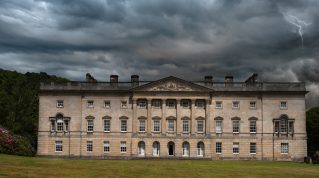A Gloucestershire residential college has stopped using “intrusive” body-worn cameras and removed a CCTV camera that pointed at a girls’ bathroom after concerns were raised with Ofsted.
Inspectors visited Hartpury College’s residential provision in November, dropping its rating by two grades from ‘outstanding’ in February 2019 to ‘requires improvement’ after noting several safeguarding issues in a report published last week.
The watchdog labelled the use of CCTV in communal areas of the accommodation and body cameras worn by residential staff as “intrusive” explaining that it “fails to respect and protect the privacy of students”.
The report said that surveillance is used to gather evidence for when incidents happen, but found that “in one accommodation block, the CCTV points at the entrance to the girls’ bathroom”.
The report noted that in the event of an incident, the surveillance provides evidence, but inspectors found that “in one accommodation block, the CCTV points at the entrance to the girls’ bathroom”.
Inspectors reported that “all students sign consent to the use of CCTV and body-worn cameras as part of the application process” but “some students said they were not aware of the use of either CCTV or body-worn cameras”.
The report said that footage recorded and uploaded was at the discretion of individual staff members, which “raises concerns about how potentially sensitive footage is handled”.
The report said that the camera pointing to the girls’ bathroom had been removed and use of body-worn cameras stopped following the education watchdog’s visit.
About 700 residential students aged between 16 and 18 were based at the college at the time of the inspection, often under the supervision of just three or four staff in the evenings and overnight.
The report said there had been times when “students have been dropped off and left without adult support at this potentially worrying time” during visits to A&E.
Inspectors also found that bunk beds were too small for some students.
Despite the concerns, Ofsted recognised that the college “generally deals well” with the inevitably high number of safeguarding concerns it faces.
However, inspectors said there was a risk of issues being overlooked because there was a lack of a centralised system for recording incidents.
The DfE’s national minimum standards for FE residential accommodation stresses that “any use of surveillance equipment (e.g. CCTV cameras) or patrolling of buildings or grounds for security purposes does not intrude reasonably on residents’ privacy, is known to students and their parents and is compliant with legislative requirements/restrictions”.
Sources have indicated to FE Week that body worn cameras are not common practice in residential colleges.
The visit was carried out in line with the social care common inspection framework, which says that a monitoring visit of residential provision judged ‘requires improvement’ or ‘inadequate’ usually takes place within six months of the original inspection.
It states that residential provision in FE colleges is usually inspected at least once in every three year inspection cycle, or within two years for those with the lowest two ratings.
Hartpury’s inspection only related to its residential provision and not its education, which remained ‘outstanding’.
A spokesperson from the college said it was “disappointed by the outcome” and explained that “we are reviewing each of the recommendations as a priority; in some cases, we have immediately taken straightforward steps to meet the improvements required”.
The spokesperson added: “It is important to emphasise the inspection found no issues whatsoever that result in the residential students’ welfare not being safeguarded or promoted. We were also pleased that alongside the recommendations there were a number of positive findings.”
The college declined to respond to additional questions from FE Week about the use of body worn cameras.
Ofsted’s report has tasked the college with ensuring surveillance doesn’t intrude on students’ privacy, staff receive appropriate training and regular reviews on residential practice, and sufficient numbers of supervising staff are available outside of teaching time.
The college’s offering includes a mix of academic, vocational and land-based courses, including in sport, agriculture and animal and equine management.
The report did however find that the college ensured students were “well-prepared for residential life” while students reported feeling safe and well-supported during the day.
It continued that leaders and managers were “responsive and proactive” in acknowledging some of the shortfalls inspectors found.

















I went there 30 years ago to study environmental science.
Imagine a big old country house with extensive grounds, a working farm, stables, equestrian centre, mini golf course, veterinary training centre, woodland, formal gardens etc.
A story relating to the lake there. They held fisheries management courses and were trying to rear trout, but unfortunately just up the hill was the dairy farm and run off from the slurry pit was causing high nutrient levels in the lake. Not good for rearing trout, but I got tasked with measuring and monitoring the biological oxygen demand for some months (in a boat in the middle of the night with various scientific gadgets). Part of our course then became researching strategies to improve water quality.
Back in those days a fair chunk of the population thought climate change was invented by the hippies in the 60s and the phrase greenwashing hadn’t come into being.
It was a beautiful setting to learn in. I passed by a few years ago and it looked like an open prison. Massive fences, turnstiles and barriers everywhere.
If that story teaches us one thing, it’s that progress is a matter of perspective.
“Inspectors reported that “all students sign consent to the use of CCTV and body-worn cameras as part of the application process.”
Am I right to assume that if the student doesn’t sign consent to this, then they cannot proceed with their application?
I couldn’t imagine a learning environment where body worn cameras are the norm.